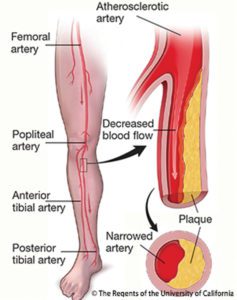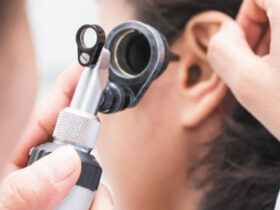 Individuals with peripheral arterial disease (PAD) have blood flow disruptions usually in the feet and legs, but it can also occur else where in the body. In fact, people with PAD are at very high risk of suffering stroke and heart attack. When the blood vessels are narrowed or clogged, the blood flow becomes obstructed and other complications can ensue. If this process occurs in the heart, you can suffer a heart attack. If this goes on in the brain, you can suffer a stroke. In fact, people afflicted with this process typically suffer from involvement of various organs (heart, kidney, brain, legs, etc). Currently, 8.5 million Americans are suffering from peripheral artery disease, many completely unaware of the reason for their symptoms.
Individuals with peripheral arterial disease (PAD) have blood flow disruptions usually in the feet and legs, but it can also occur else where in the body. In fact, people with PAD are at very high risk of suffering stroke and heart attack. When the blood vessels are narrowed or clogged, the blood flow becomes obstructed and other complications can ensue. If this process occurs in the heart, you can suffer a heart attack. If this goes on in the brain, you can suffer a stroke. In fact, people afflicted with this process typically suffer from involvement of various organs (heart, kidney, brain, legs, etc). Currently, 8.5 million Americans are suffering from peripheral artery disease, many completely unaware of the reason for their symptoms.
Because PAD typically causes pain in the legs, it can be mis-interpreted as arthritis, back or spinal pain, or any number of other problems. The first step in formulating an effective treatment strategy is identifying the underlying problem accurately.
Maintaining a healthy diet is critical to keeping your lipid levels in proper balance, thereby helping to keep your arteries clean and free from blockage. I recommend a diet rich in healthy fruits, vegetables, lean protein and healthy fats (mono- and poly-unsaturated fats). Avoiding or minimizing simple carbohydrates like white bread, white rice, highly refined flour products, and sugars is also very important. Preventing atherosclerosis can be achieved through medications as well. However, if the blockage from PAD is severe and lifestyle limiting, a medical procedure may be necessary to open and repair the artery to allow blood to flow normally again.
Symptoms of PAD
• Claudication (leg and calf pain while walking)
• Weak pulse in ankle or foot
• Hair loss on legs and feet
• A sensation of tightness & burning in the leg or foot
• Dry, itchy skin
• Slow to heal wounds or ulcers of the feet
• Discolored and irregular toe nails
Although arterial insufficiency can happen to anyone, some of the common factors that put you at risk are family history, smoking, diabetes, high blood pressure, high cholesterol, being overweight, poor diet, and a sedentary lifestyle.
Treatment Options for PAD
• Peripheral Vascular Stent
• Angioplasty
• Bypass Grafting
• Worst case may require Amputation if nothing is
done early on!
Because this disease process can be very treatable when caught early, but options grow more limited as the disease progresses, it is critical to seek medical attention when an individual begins to experience symptoms. Again, if PAD is recognized early on it can be treated effectively to prevent further damage to your circulatory system, vital organs, and your overall health. If you or someone you know is experiencing any vascular issues or may have questions about this important issue, please contact your physician immediately. If you don’t know who to reach out to, please call us so that we can assist with this process, as it can sometimes be rather overwhelming to know who best to contact.
Dr. Joseph Freedman MD, MBA
Dr. Freedman brings many years of experience as a cutting edge cardiologist specializing in the prevention, diagnosis, and treatment of all cardiac disease. He trained at the prestigious Cleveland Clinic, continually ranked #1 in Cardiovascular Care, where he focused on cardiac imaging. He achieved five board certifications in Internal Medicine, Cardiology, Comprehensive Adult ECHO, Nuclear Cardiology and Cardiac CT. During his tenure as the lead noninvasive cardiologist at Florida Medical Center in Ft. Lauderdale, he helped lead the hospital to achieve Level 5 chest pain certification, the highest designation of cardiac excellence.
He has spoken on national health care radio programs and has appeared on local news, highlighting the latest in cardiovascular care. Dr. Freedman prides himself on being an advocate for the patient. Every patient is unique, and he works carefully with leading local and national experts to make sure patients receive the best specialty procedural care possible for that particular case. Dr. Freedman has done research in cardiac MRI studies of the heart, in nuclear scanning, and has participated in the research trials of several leading cholesterol-lowering drugs. Dr. Freedman also has extensive experience in pulmonary hypertension and ran a large clinic in Broward County for these specific and often undiagnosed patients. Dr. Freedman speaks Spanish as well.
Cardiac Care Group
3208 Chiquita Blvd S., Suite 110
Cape Coral, FL 33914
(239) 574-8463
www.flccg.com
This information is for educational purposes only and is not intended to replace the advice of your doctor or health care provider. We encourage you to discuss with your doctor any questions or concerns you may have.








